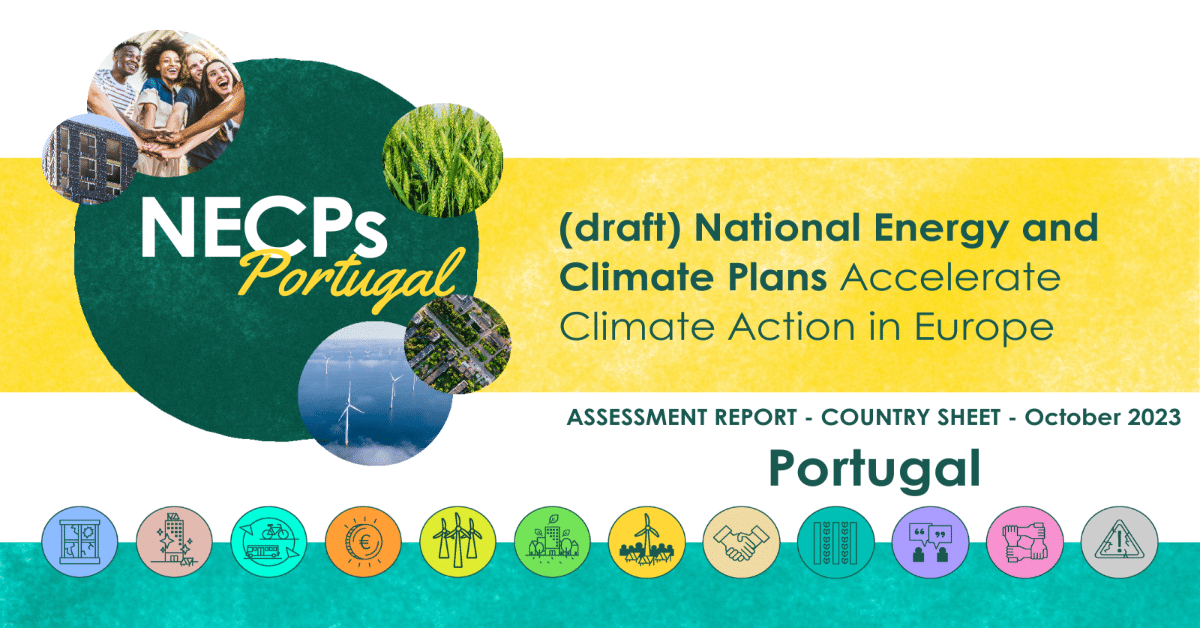Portugal submitted its draft National Energy and Climate Plan (NECP) update on time. This assessment is based on the draft available on the Commission’s website. Overall Portugal does not move towards a 1.5° trajectory. The plan fulfils the minimum EU requirement for climate effort sharing. However, the energy efficiency contribution is not in line with the EU 2030 energy efficiency target and it is unclear whether the contribution for renewable energy is in line with the EU-binding renewables target. Policies and measures (PAMs) overall lack detail and are insufficient in some sectors.
RECOMMENDATIONS
- Do not use the increased renewables capacity on expensive hydrogen production to export through the H2Med, as hydrogen transport is a highly inefficient process;
- Better detail the policies and measures, to ensure consistency with the proposed targets (e.g. impact on emissions, financing needs,indicators to assess achievements and a shorter horizon of application);
- Include more transformative measures for sectors that are currently out of their 2030 target trajectory, such as transport, agriculture, energy consumption and efficiency.
-
Climate Ambition
The 2030 economy-wide target is a -55% gross reduction compared to 2005 levels, which reflect the new National Climate Law and corresponds to the higher value of the 45-55% range set in the 2019 NECP. The 2030 non-ETS target reflects Portugal’s requirement under the Effort-Sharing Regulation (-28.7% compared to 2005). Notably, the economy-wide target uses 2005 as a baseline year, which corresponds to the moment of peak emissions in Portugal; the percentage of reduction is lower if compared to 1990 levels.
The draft does not provide enough elements to ensure the credibility of these targets. Scenarios with additional measures are not presented for all sectors (and not for non-ETS sectors as a whole). PAMs are only vaguely described: the impact on emissions, achievement indicators and required funding are not quantified and the timeline for their application is generally too broad. For agriculture – where Portugal failed to meet its 2020 target – no additional measures are presented and PAM 6.2 continues to finance intensive livestock production. For transport – where emissions are constantly increasing – substantial investments in public transport and railways are required.
Energy Transition
Portugal sets a renewable energy contribution of 49 % in 2030. It is unclear if this will be in line with the Governance Regulation formula benchmark to reach the binding EU 2030 renewable energy share of 42.5%. The sectoral target for transports of incorporating 23% renewables is insufficient, according to REDIII it should be at least 29%. In addition, the plan undervalues the potential of decentralised energy production and energy communities. Decentralised solar has a higher potential that what is proposed (5.5GW of installed capacity by 2030), while measures should be included to facilitate access for energy communities to centralised energy production, such as the introduction of non-economic criteria in the selection procedure for new projects. PAM 3.7 promotes biomass use, but without including an assessment of the potential of residual biomass, nor mentioning the cascading principle in its use.
With a 35% primary energy consumption reduction target compared to 2007 projections, Portugal’s draft plan equals a level of energy consumption of 20.73 Mtoe for primary energy, according to own calculations. The target has not been updated since Portugal’s 2019 NECP and it is not in line with the requirements of the 2023 Energy Efficiency Directive (EED) and with the 2030 EU energy efficiency target. Portugal fails to indicate a national contribution for final energy consumption in 2030, which should surpass the minimum energy consumption reduction amounting to 13.41 Mtoe as per EED formula benchmark. The gap towards the required contribution as per formula in the 2023 directive amounts to 5.57 Mtoe for primary energy consumption. Elements from the Portuguese Long-Term National Strategy to Combat Energy Poverty, which is not yet approved, should be included in the final NECP, especially with regards to indicators on thermal comfort that should not be dissociated from energy consumption reduction. Energy efficiency measures lack details, as PAMs in general across all sectors, including the quantification of energy savings per measure.
FOSSIL FUELS ALERT
- Fossil gas – The draft projects fossil gas to be phased out by 2040. However, fossil gas infrastructure decommissioning or reconversion is never discussed, and some elements of the plan seem to go in the opposite direction: PAM 4.8.3 boosts maritime LNG infrastructures.
FALSE SOLUTION ALERT
- The significant expansion of hydrogen capacity mainly to export through the H2Med (PAM 4.11) is highly inefficient and its needs are unjustified
- A voluntary carbon market (PAM 1.11) is a risk given the huge uncertainties as to its real contribution in reducing emissions. At most, it could be an additional instrument, on top of more robust PAMs.
IS MONEY WHERE THE MOUTH IS?
- Funding sources, including EU funds, are identified for most PAMs, while financing needs are not. PAMs are potentially competing over the same funding sources, and the feasibility of the plan could be at risk.
SNEAKY SUBSIDIES
- The NECP includes a phase out plan for fossil fuel subsidies, although it does not foresee the end of exemptions to the tax on oil and energy products and to the carbon tax for fossil gas in the electricity sector, (its gradual phase out is not defined after 2024).
PUBLIC PARTICIPATION
- While public consultations took place early enough, no draft was presented and no discussions on scenarios took place, both for the ‘public consultation’, where the public was asked to fill in a questionnaire, and for the ‘participatory assemblies’.
- Multilevel dialogues took place thanks to the LIFE NECPlatform project, with the participation of local authorities, energy agencies and national representatives responsible for drafting the NECP (APA and DGEG). APA and DGEG prevented civil society organisations (besides ZERO) and private sector representatives from participating. It is unclear to what extent the dialogue influenced the draft NECP update.
Download PORTUGAL country sheet NECP assessment report
Download FULL NECP assessment report
PREVIOUS
NEXT

